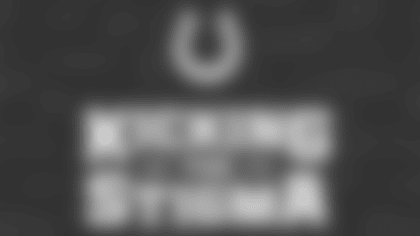Kicking The Stigma, the Irsay family and Colts' mental health initiative, has done plenty to raise awareness and improve treatment of mental health in Indiana and across the country since it was founded in 2020.
There have been several mental health PSAs, featuring prominent members of the Colts and NFL community. And through Kicking The Stigma action grants, millions of dollars have been provided to non-profit organizations to fund mental health treatment programs.
But through the opening of the Irsay Institute at Indiana University earlier this month, Kicking The Stigma put a focus on funding and supporting mental health research – the kind of research that will inform future treatment programs and increase the impact of awareness efforts. And it just so happens that the Irsay Institute is led by several women established as leading experts in their fields, all of which are connected to mental health.
Bernice Pescosolido is the director of the Irsay Institute and is a Distinguished Professor of Sociology at IU, and is regarded nationally as a leading expert on stigma. Associate directors Brea Perry (Professor of Sociology, with an emphasis on mental illness and substance abuse disorders) and Kosali Simon (a healthcare economist who can provide methods to create more integrated and collaborative research within the institute).
Three of the four senior research program leaders at the Irsay Institute are women, as are several other researchers and staff members. Colts Owner/Vice Chair Kalen Jackson described it as kismet – the best people for these positions not only were at Indiana University, but they're women.
And they're women working in Morrison Hall, which is named for Sarah Park Morrison, IU's first female graduate.
"Talk about stigma — females in science and math, it's still a big hurdle," Jackson said. "If you look at the numbers, it's low. So to be able to see that, and the representation for young girls being able to see that's something they can aspire to be and that is something you're capable of, I think that's really neat."
As Kicking The Stigma continues to raise awareness about mental health disorders, and continues to expand mental health treatment programs, Jackson sees the Irsay Institute as helping grow the workforce capable of providing treatment. Through research conducted and programs directed by the Irsay Institute, Jackson hopes the number of professionals qualified to provide that treatment grows.
Since, as Jackson explained: "The stigma part's great, but if there's nothing there to support the people that realize I can go get help, then we're failing in that sense."
Opening training centers within college and universities is a big part of those efforts to grow the workforce. It's not about training more psychologists – what's needed are people trained in evidence-based practices for specific disorders, so those people afflicted by those disorders can get the exact help they need.
Additionally, as the stigma surrounding mental health continues to be broken down, there will be a need for more staffing for 988, the National Suicide Prevention Lifeline.
And while the work the Irsay Institute is doing and will do in the future will be important to increase staffing, just the presence of it alone can help combat the stigma of getting into the mental health field. Jackson said she's learned there's a stigma of getting into mental health treatment as a profession – some consider it dangerous and others are guided toward being a physical medical doctor, even if their passion is in treating mental health.
"For a long time, and even still today, they're seen as — it's not really medicine, and mental health is not really heath," Jackson said. "And institutes like this and support like ours is saying no, it is, and here's how and here's why, and here's how it can help you."
Studies around mental health and stigma can, after a rigorous process, but turned into evidence-based practices and treatments, which then will need qualified professionals to administer them. And, someday, those evidence-based treatments could turn into programs funded by Kicking The Stigma.
The work being conducted at the Irsay Institute was already being done, but bringing it under one roof should accelerate that research through collaboration across several emphasis areas, all of which tie into mental health.
"They're all interconnected," Jackson said. "They all work together. And that's what the beauty of having the institute is now — people might have different focus areas, but they can share and collaborate with each other because there is overlap and they are affecting each other, and I think that's how you get better, and that's how the studies become more effective once they're out into the world and published."
At a kickoff event for the new Irsay Institute, IU President Pamela Whitten joined Kalen Jackson, vice chair and owner of the Indianapolis Colts, and Bernice Pescosolido, Distinguished Professor of Sociology in the IU College of Arts and Sciences and director of the institute, to celebrate the opening. The Irsay Institute, a new research institute at Indiana University in Morrison Hall on the IU Bloomington campus, has formally launched its mission to become a leading national center for addressing the stigma surrounding mental illness and other health issues such as HIV, epilepsy, cancer, dementia and addiction.


Kalen Jackson Vice Chair/Owner






Kalen Jackson Vice Chair/Owner, Steve Campbell Vice President of Communications

Kalen Jackson Vice Chair/Owner, Steve Campbell Vice President of Communications

Kalen Jackson Vice Chair/Owner

Steve Campbell Vice President of Communications

Kalen Jackson Vice Chair/Owner

Kalen Jackson Vice Chair/Owner

Kalen Jackson Vice Chair/Owner

Kalen Jackson Vice Chair/Owner



Kalen Jackson Vice Chair/Owner

Kalen Jackson Vice Chair/Owner

Kalen Jackson Vice Chair/Owner

Kalen Jackson Vice Chair/Owner

Kalen Jackson Vice Chair/Owner

Kalen Jackson Vice Chair/Owner

Kalen Jackson Vice Chair/Owner

Kalen Jackson Vice Chair/Owner

Kalen Jackson Vice Chair/Owner


Diego Pleitez Community Relations Coordinator

Kalen Jackson Vice Chair/Owner

Kalen Jackson Vice Chair/Owner

Kalen Jackson Vice Chair/Owner

Kalen Jackson Vice Chair/Owner

Kalen Jackson Vice Chair/Owner

Kalen Jackson Vice Chair/Owner


David Thornton Director of Player Engagement, Dave Knickerbocker Vice President of Content and Production, Steve Campbell Vice President of Communications, Stephanie Pemberton Vice President of Marketing, Blue, Ashley Powell Director of Community Relations, Kelsey Rowles Community Relations Manager, Diego Pleitez Community Relations Coordinator, Kalen Jackson Vice Chair/Owner, Boyd Jackson Pro Personnel Assistant

Kalen Jackson Vice Chair/Owner

Kalen Jackson Vice Chair/Owner, Blue

Kalen Jackson Vice Chair/Owner, Boyd Jackson Pro Personnel Assistant

David Thornton Director of Player Engagement, Diego Pleitez Community Relations Coordinator, Kelsey Rowles Community Relations Manager, Ashley Powell Director of Community Relations














